The Rationalists of the 1950s (and before) also called themselves “Rationalists”
TLDR
There’s an organization based in London called the Rationalist Association. It was founded in 1885. Historically, it focused on publishing books and articles related to atheism and science, including works by Darwin, Bertrand Russell, J. B. S. Haldane, George Bernard Shaw, H. G. Wells, and Karl Popper.
The topics covered overlap with the present-day rationalist movement (centered on Lesswrong). They include religion and atheism, philosophy (especially philosophy of science and ethics), evolution, and psychology.
According to Wikipedia, membership of the Rationalist Association peaked in 1959 with more than 5000 members and with Bertrand Russell as President.
This post displays some covers of Rationalist Association publications, and links to full-text articles and other resources.
Prior to reading this biography, I hadn’t heard of these earlier rationalists. So I did some quick and shallow research. I’d be curious to know more about this history. It might be worth adding a note to this LW Wiki entry.
Past covers of the Rationalist Association publications
1896 Cover
This is a journal for short articles called the “Agnostic Annual” (later “Rationalist Annual”). The full text is here.
Some quotes from the article “Mind as controlled by matter” below.
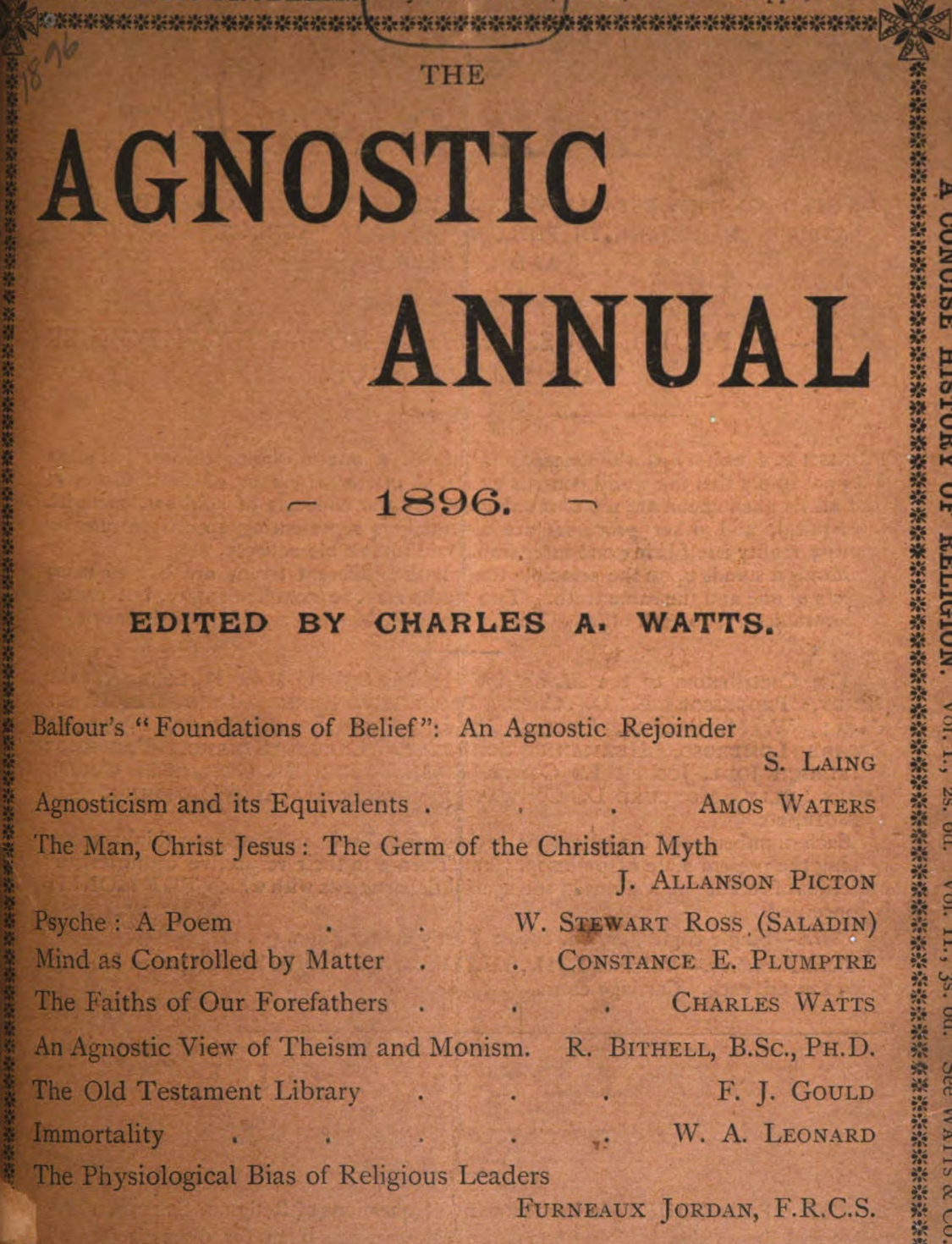
1938 Cover
Includes articles by Bertrand Russell and evolutionary biologist and proto-transhumanist J. B. S. Haldane.
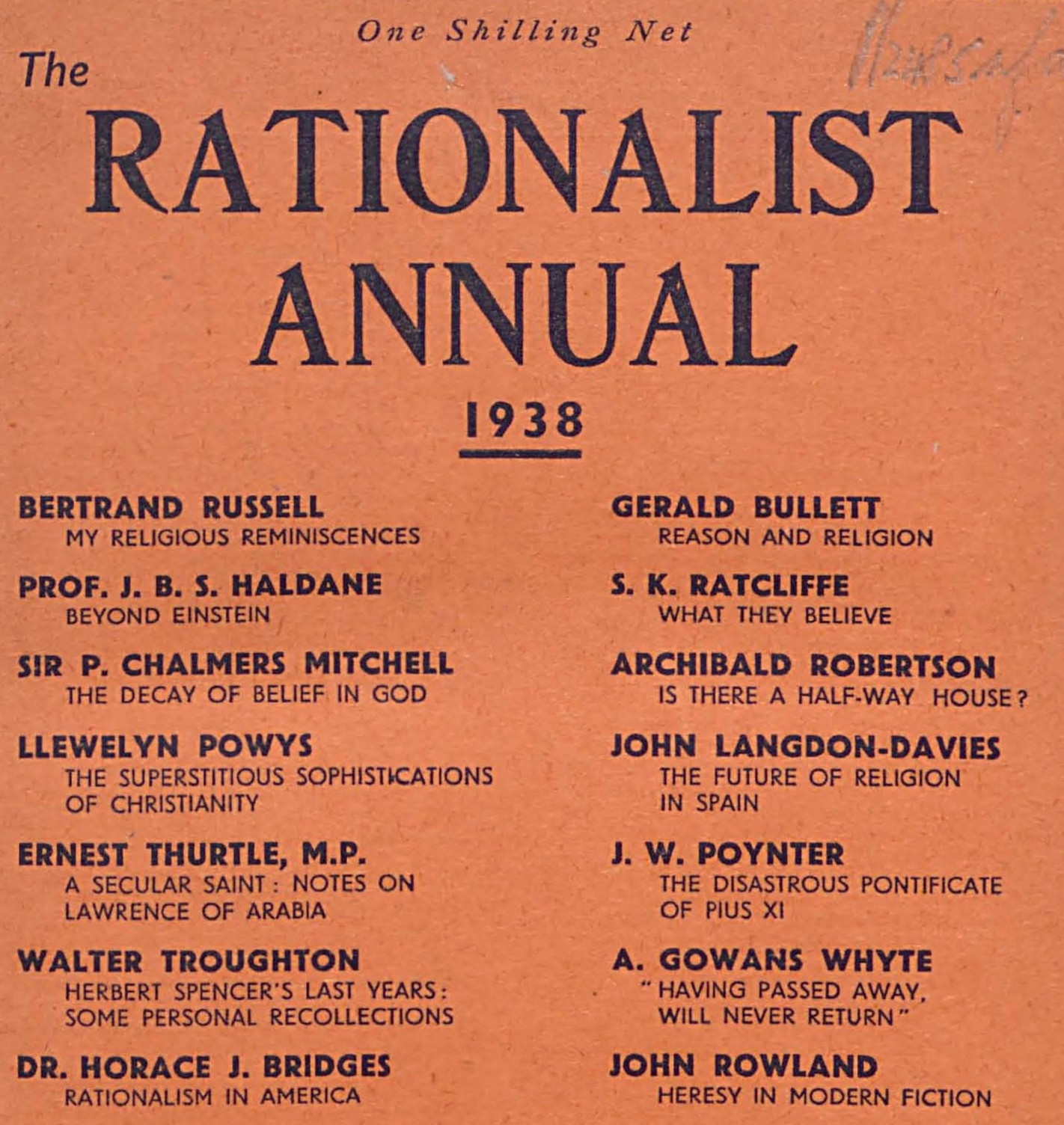
1954 Cover
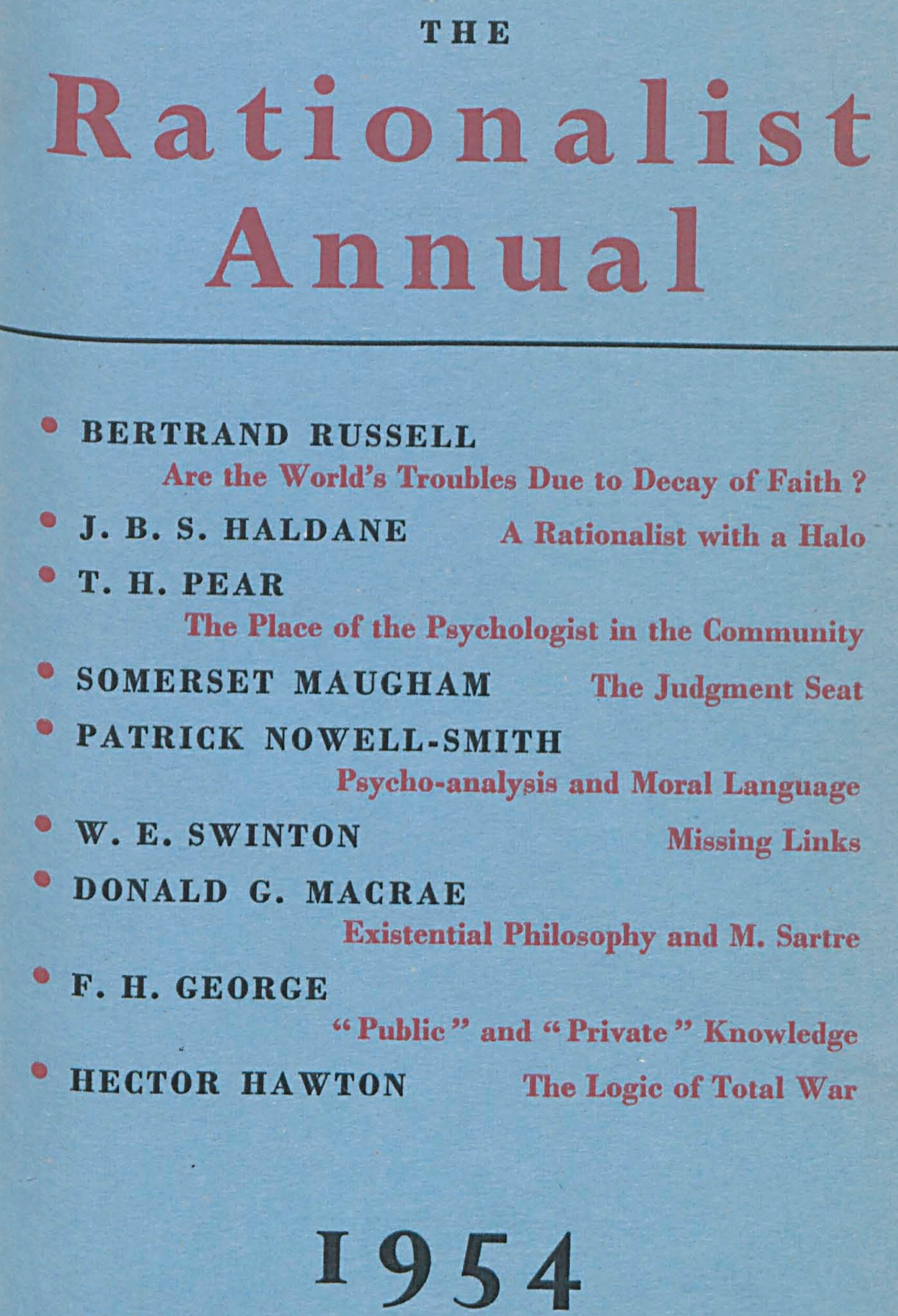
1971 Cover
This is for a magazine called The Humanist, published by the Rationalist Association. It has since published articles by Richard Dawkins and Daniel Dennett.
Contents: “Rationalist Tasks”, “Motoring Safety”, “Quasi-rational Quarrelling” and the first appearance of the famous Philip Larkin poem that begins “They fuck you up, your mum and dad”.
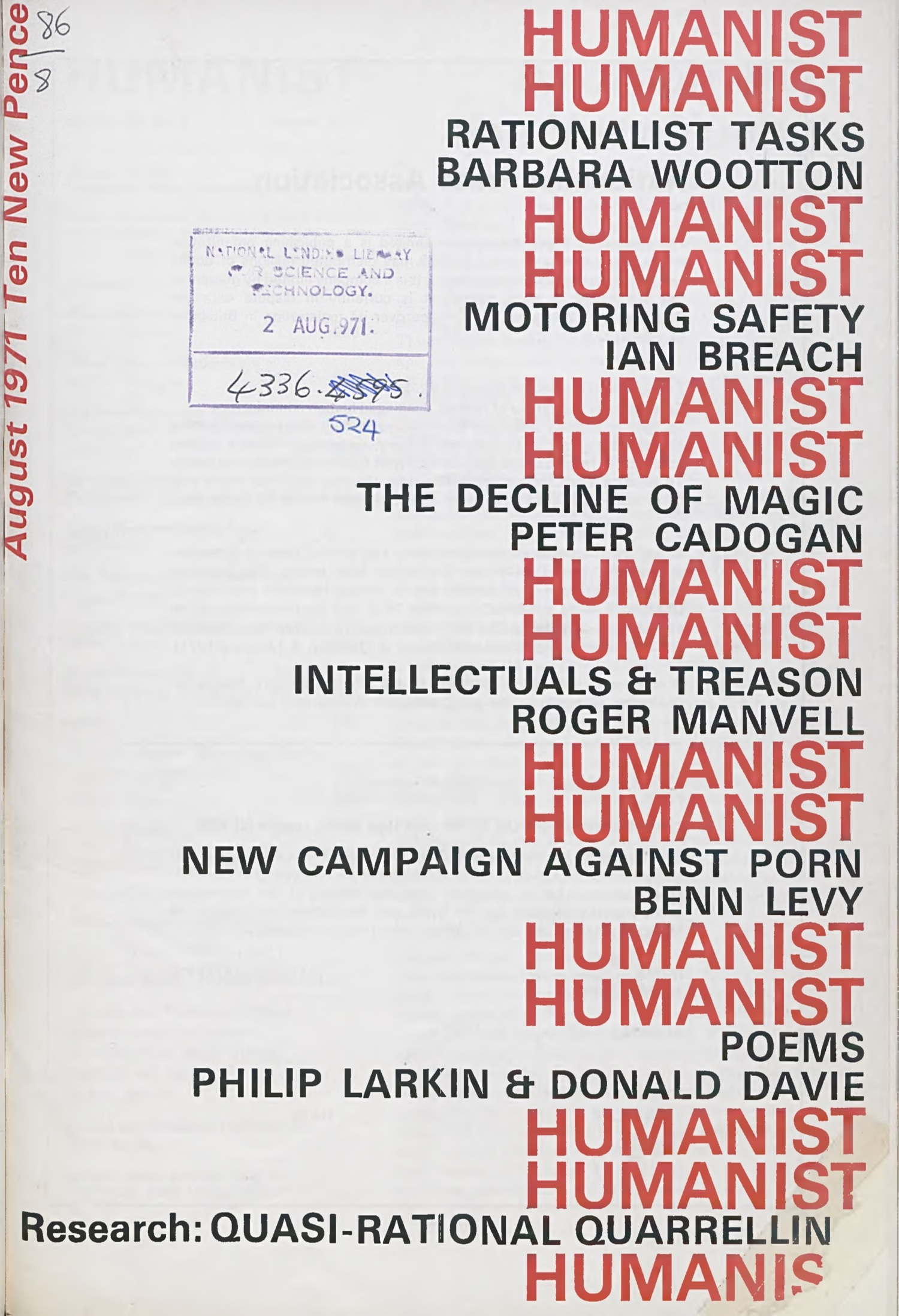
Links and Full-text
1. Full-text articles from the Rationalist Annual by the prolific biologist, popular science writer and communist, J. B. S. Haldane. Some titles:
Why I am a Materialist
The Laws of Nature [probabilistic theories in physics and genetics, Laplace’s Demon]
The Limitations of Rationalism [cognitive limitations and biases—see below]
A Rationalist Approach to the Problem of Sexual Relations
On Being Finite [reflections on death and meaning in life—see below]
2. Full-text article by Ernest Gellner “On Being Wrong” [epistemic corrigibility]
3. Wikipedia on the (British) Rationalist Association, the Indian Rationalist Association, and the Rationalist International.
4. Archive of the Rationalist Annual and New Humanist (pay-walled).
Some Random Quotes
Yet it seemed to me that we have greater control over the material than the immaterial; it being easier, for instance, to regulate diet than to command success [see Scott Alexander]; and that, this being so, we must learn to call nothing common nor unclean, but consider a careful investigation into the influences of food, medicine, and climate as beneath the notice neither of philosopher nor moralist
…
‘Of all the great branches of human knowledge, medicine is that in which the accomplished results are most obviously imperfect and provisional. The medicine of inhalation is still in its infancy; and yet it is by inhalation that nature produces most of her diseases, and effects most of her cures’
From “Mind as controlled by matter” by Constance Plumptre (1896)
More serious is my own and other people’s limited reasoning power. I simply cannot grasp a sufficiently complicated argument. The limitations of different intellects vary. Every educated person can factorize 35 in his or her head. I can factorize such numbers as 11,009; a few people can factorize six-figure numbers, however large their factors, Nobody can factorize twenty-figure numbers with large factors. This kind of thing can be done with a specially designed machine, and machines can already vastly extend the scope of our reasoning power in the field of mathematics. I believe that we are only at the very beginning of the use of mechanical aids to reasoning, and that they will be as important as mechanical supplements to our senses, such as microscopes. But they will only take us a certain distance.
From “The Limitations of Rationalism” by J. B. S. Haldane (1947 -- link)
I have tried morphine, heroin, and bhang and ganja (hemp prepared for eating and smoking). The alterations of my consciousness due to these drugs were trivial compared with those produced in the course of my work [as an evolutionary biologist]. I once dreamed that I was reading a life of Christ written and illustrated by Edward Lear. But I can only remember Pontius Pilate’s moustache. If you want a dream as original as that, don’t take opium, but eat sixty grams of hexahydrated strontium chloride [not medical advice—OE]. I have had some of the standard adventurous experiences such as being pulled out of a crevasse in a glacier, and more which are unusual. For example, I was one of the first two people to pass forty-eight hours in a miniature submarine, and one of the first few to get out of one under water. I doubt whether, given my psychological make-up, I should have found many greater thrills in a hundred lives. So when the angel with the darker drink at last shall find me by the river’s brink, and offering his cup, invite my soul forth to my lips to quaff, I shall not shrink.
From “On Being Finite” by J. B. S. Haldane (1965 -- link)
Bonus
Past presidents of the Rationalist Association include Bertrand Russell, the founder of the Bletchley Park estate, the co-founder of the London School of Economics, and my dad’s ex-father-in-law.
Here’s an effusive advert for a book on “The Science of Life” by H. G. Wells, Julian Huxley and G. P. Wells:
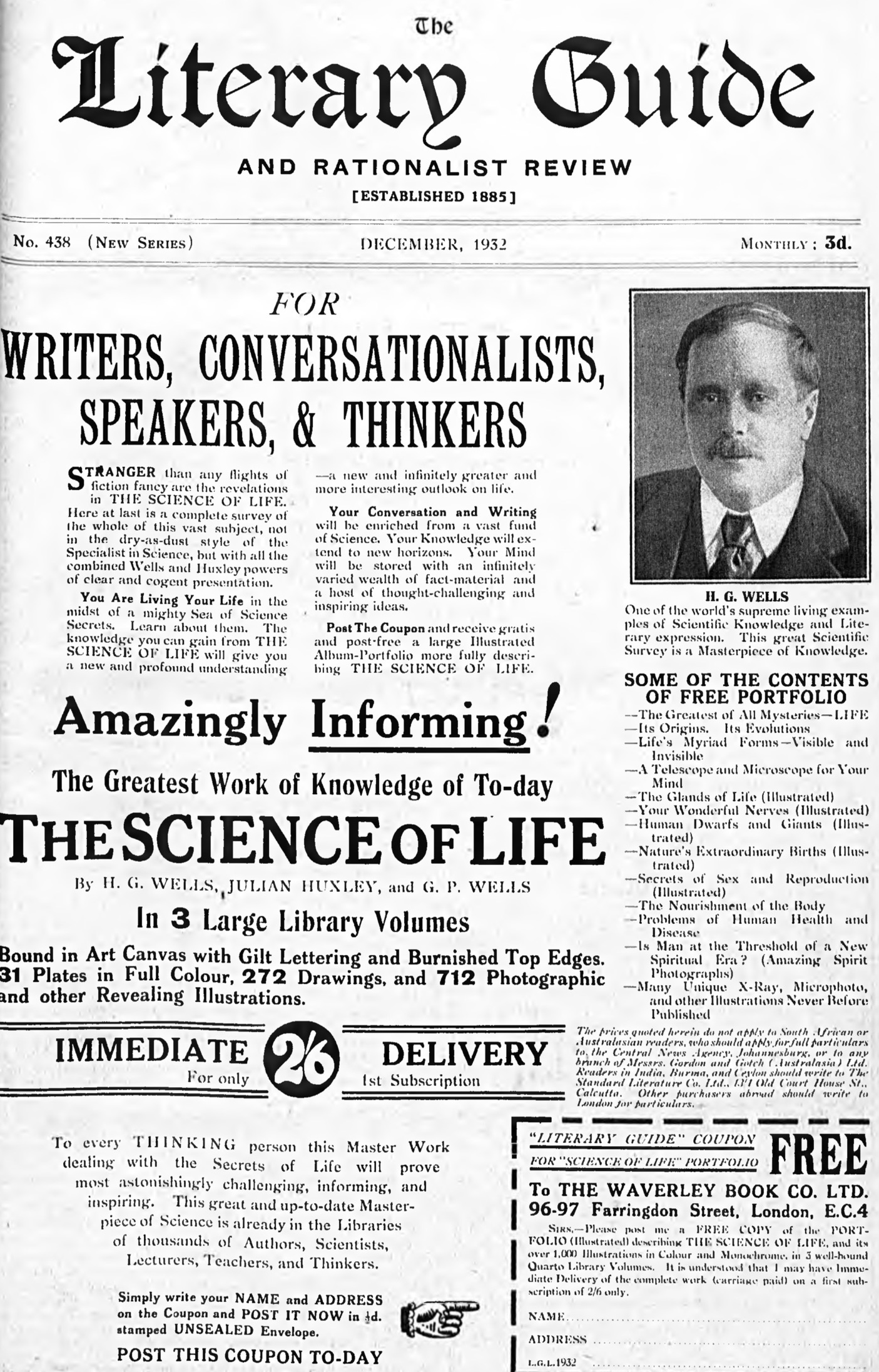
- Lives of the Cambridge polymath geniuses by (Jan 25, 2022, 4:45 AM; 108 points)
- Bibliography of EA writings about fields and movements of interest to EA by (EA Forum; Feb 21, 2022, 3:11 PM; 98 points)
- Prizes for the 2021 Review by (Feb 10, 2023, 7:47 PM; 69 points)
- Voting Results for the 2021 Review by (Feb 1, 2023, 8:02 AM; 66 points)
- What’s with all the bans recently? by (Apr 4, 2024, 6:16 AM; 62 points)
- Were there any ancient rationalists? by (May 3, 2024, 6:26 PM; 11 points)
- 's comment on On Philosophy Tube’s Video on Effective Altruism by (EA Forum; Feb 28, 2023, 2:43 AM; 3 points)
This post points at an interesting fact: some people, communities or organizations already called themselves “rationalists” before the current rationalist movement. It brings forth the idea that the rationalist movement may be anchored in a longer history than what might first seem from reading LessWrong/Overcoming Bias/Eliezer history.
However, this post reads more like a Wikipedia article, or an historical overview. It does not read like it has a goal. Is this post making some sort of argument that the current rationalist community is descended from those earlier groups ? Is it poking at the consensus history of how the rationalist community ended up choosing “rationalist” as an identifier ? I don’t know whether any of those things is argued in this post.
This feels like an interesting bag of facts, full of promising threads of inquiry which could develop in new historical insights and make great posts. I am looking forward to reading those follow-ups, but for now this feels incomplete and lacking purpose.